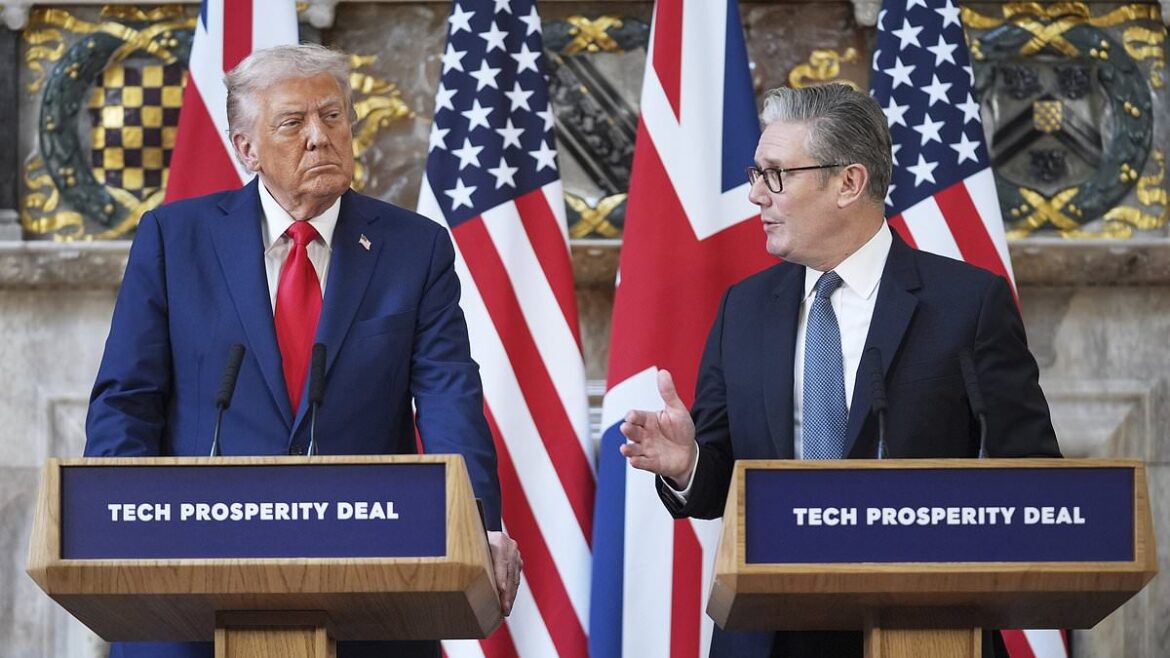Donald Trump’s second official State Visit to the UK began with all the pageantry one would expect—banquets, red carpets, and warm greetings from King Charles at Windsor.
But by the time the U.S. president arrived at Chequers for political talks with Prime Minister Keir Starmer, the conversation had turned sharp, touching on immigration, Gaza, Ukraine, and even Britain’s traditions of free speech.
Trump Pushes Hard Line on Immigration
At their joint press conference, Trump made headlines by urging Starmer to consider deploying the military to stop illegal immigration.
He warned that illegal arrivals “destroy countries from within,” a pointed contrast to the UK government’s ongoing struggle with Channel crossings.
Trump even boasted that he had shut the U.S. southern border with “zero” illegal entries—an awkward moment given the pressure Starmer faces at home.
Disagreements Over Gaza and Palestine
One of the thorniest exchanges came over Gaza. Starmer urged fresh efforts to bring peace to the region, while Trump dismissed the idea of recognizing a Palestinian state.
The U.S. president didn’t shy away from stressing the disagreement, yet added his own veiled criticism of Britain’s direction by praising the “traditions of British liberty” and warning they must continue.
Ukraine and Putin in the Spotlight
The leaders also clashed in tone over Russia’s war on Ukraine.
Starmer condemned Vladimir Putin’s attacks as proof he had no interest in peace. Trump, in unusually blunt terms, admitted that Putin had “let me down—he’s really let me down.”
It was one of the toughest statements he has made about the Russian president, and one that signaled a cooling of their once-close rhetoric.
Trade, Technology, and Investment Promises
Beyond foreign policy, the day also brought big economic headlines.
The two leaders signed a major technology investment agreement at Chequers, which Trump said would help drive the “next technological revolution.”
Starmer hailed the pact as proof the UK and U.S. were “first partners” not just in defense and trade, but also in science and technology.
Meanwhile, Chancellor Rachel Reeves hosted a high-profile reception for business leaders from Blackstone, Palantir, Barclays, and BlackRock to highlight £150 billion of fresh U.S. investment in Britain.
A Complicated Friendship
Despite their differences, both men went out of their way to stress their personal rapport.
Trump described Starmer as a “great negotiator,” while Starmer said their relationship was rooted in mutual respect and genuine liking.
“You are among friends,” he told the president warmly at the business gathering.
Trump, in turn, praised the hospitality, thanking the King and Queen, and reflecting that Windsor and Chequers looked “even more beautiful and historic” than on his previous visit.
Diplomatic Landmines Lurking
Still, the visit was not without risks for Starmer. Questions lingered about the sacking of U.S. ambassador Lord Mandelson over his ties to Jeffrey Epstein—a sensitive issue given Trump’s own past controversies.
The prime minister initially defended Mandelson but quickly reversed course, sparking anger within his own Labour Party.
Efforts to remove U.S. tariffs on British steel imports also appeared to have stalled, leaving another gap in the “special relationship.”
Ceremony and Symbolism
Despite the political disputes, Trump emphasized the symbolism of his visit.
He called the UK-U.S. bond “unbreakable” and described the relationship as a “beautiful inheritance” handed down through history.
At Windsor and Chequers, the president was greeted with RAF honor guards, bagpipers, and red-carpet welcomes, while his wife Melania spent the day with the Royals.
Starmer presented Trump with a personalized ministerial red box to take back to the White House and showed him rare documents from the Churchill archives.
What Comes Next
As the State Visit shifts into its later stages, Starmer will be keen to steer the focus back to investment and away from controversies.
But Trump’s freewheeling style with the media, his strong words on immigration and Gaza, and unresolved issues like tariffs and the Mandelson fallout mean this visit could still spring further surprises.
Both leaders, however, are determined to frame it as the beginning of a “renewed special relationship” fit for the challenges of this century.
